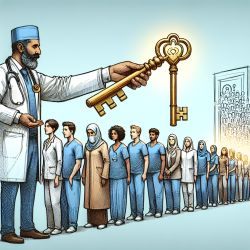Pain management is a critical component of healthcare, especially in paediatric rheumatology where young patients often present with chronic musculoskeletal pain. Despite its importance, recent research highlights significant gaps in the training curricula for healthcare professionals specializing in this field. Understanding and addressing these gaps can greatly enhance the quality of care provided to young patients.
The Current State of Pain Education
A study titled "Identifying the content and context of pain within paediatric rheumatology healthcare professional curricula in the UK: a summative content analysis" reveals that pain-related content is severely underrepresented in the training documents of healthcare professionals. Pain themes account for only 1.51% of text across all reviewed documents, indicating a need for substantial improvement.
This lack of emphasis on pain education is concerning, as chronic musculoskeletal pain is a common complaint among children and adolescents referred to paediatric rheumatology clinics. Without adequate training, healthcare professionals may struggle to effectively assess and manage these conditions.
Key Findings from the Research
- Pain is often presented as a simple 'somatic' symptom rather than a complex phenomenon involving biological, psychological, and social processes.
- The assessment and management of pain are vaguely addressed, lacking specific guidelines or strategies.
- Pain is rarely discussed in the context of both inflammatory and non-inflammatory conditions, despite being a common feature of each.
Recommendations for Improvement
To address these gaps, the study suggests several recommendations:
- Reconceptualize Pain: Integrate contemporary pain theories that recognize pain as a biopsychosocial phenomenon affecting both inflammatory and non-inflammatory conditions.
- Enhance Pain Assessment Education: Provide detailed training on various assessment tools and techniques to ensure accurate diagnosis and effective management.
- Focus on Communication: Emphasize the importance of developing communication skills tailored to discussing pain with children and their families.
- Expand Management Strategies: Include comprehensive guidelines on both pharmacological and non-pharmacological treatment options.
The Role of Healthcare Professionals
Healthcare professionals play a pivotal role in managing paediatric rheumatology patients' pain. By adopting these recommendations, practitioners can improve their confidence and competence in handling complex pain cases. This not only enhances patient outcomes but also fosters a more empathetic approach to care.
Furthermore, engaging with contemporary research and participating in continuous professional development opportunities can help practitioners stay abreast of advancements in pain management strategies. Networking with peers through conferences and webinars can also provide valuable insights into best practices.
Conclusion: A Call to Action
The findings from this research underscore the urgent need for reform in the educational curricula guiding paediatric rheumatology professionals. By prioritizing comprehensive pain education, we can ensure that future generations of healthcare providers are well-equipped to deliver high-quality care to young patients suffering from chronic pain conditions.










